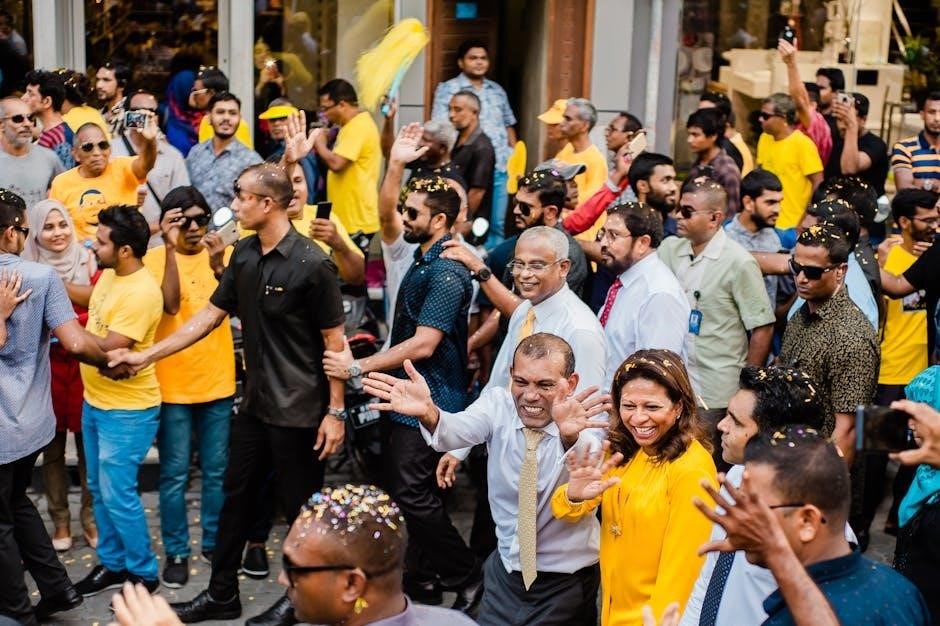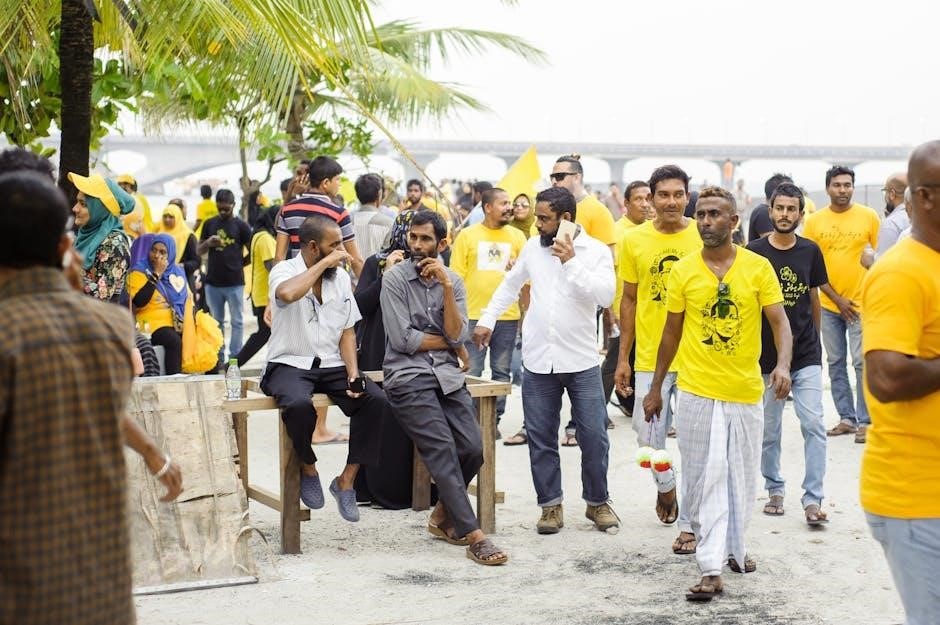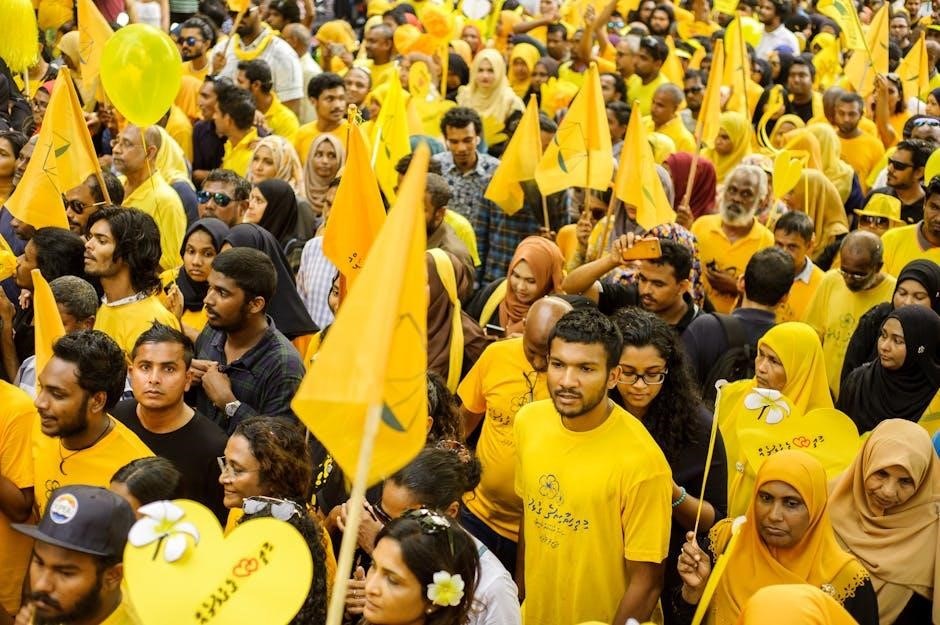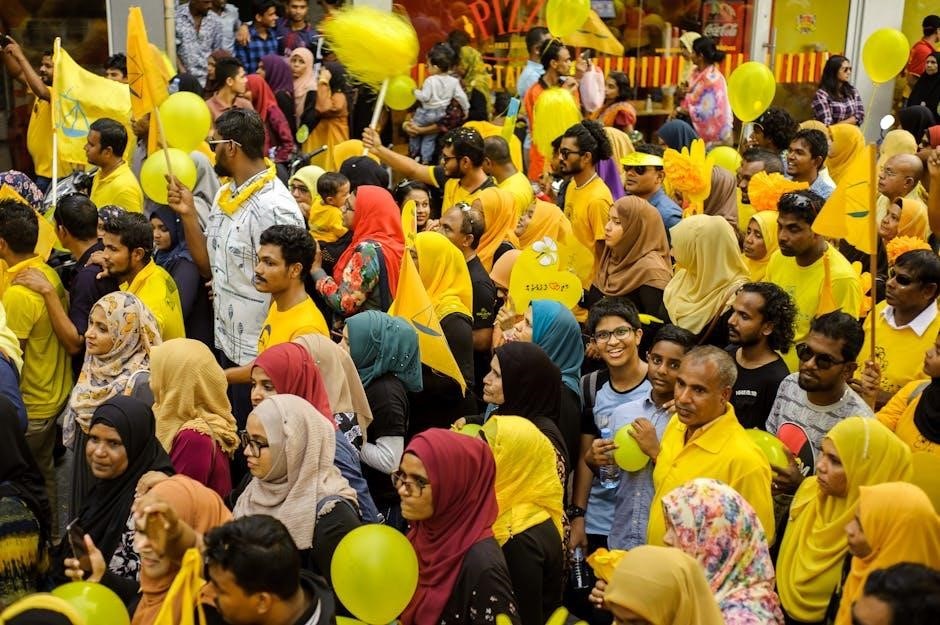This guide challenges common perceptions‚ offering a provocative analysis of Islam’s teachings‚ history‚ and impact‚ encouraging critical thinking beyond politically correct narratives.
1.1. Understanding the Purpose of the Guide
The Politically Incorrect Guide to Islam aims to provide an unbiased‚ critical examination of Islamic teachings‚ history‚ and cultural impact. It challenges prevailing narratives by addressing controversial topics such as Jihad‚ Sharia law‚ and the treatment of women and non-Muslims. The guide seeks to inform readers about aspects often overlooked in mainstream discussions‚ encouraging a deeper understanding of Islam’s complexities. By exploring these topics‚ it aims to foster open dialogue and critical thinking‚ rather than relying on politically correct assumptions or sensitivities.
1.2. The Importance of Critical Analysis in Discussing Islam
Critical analysis is essential when discussing Islam to move beyond politically correct narratives and explore its complexities; It encourages examining historical and contemporary practices‚ such as Jihad and Sharia‚ objectively. By challenging assumptions‚ critical analysis fosters a deeper understanding of Islam’s teachings and their impact on societies. This approach promotes open dialogue‚ enabling readers to engage with controversial topics like women’s rights and religious intolerance. Critical analysis also highlights the need for intellectual honesty in addressing Islam’s role in shaping global dynamics and cultural interactions‚ ensuring a balanced and informed perspective.
The Origins of Islam
Islam originated in the 7th century in Arabia‚ founded by Muhammad‚ who received revelations recorded in the Quran‚ shaping a faith that expanded rapidly across continents.
2.1. The Life and Teachings of Muhammad
Muhammad‚ born in Mecca around 570 CE‚ is Islam’s prophet. His teachings‚ revealed in the Quran‚ emphasize monotheism and moral guidance. Critics argue his military campaigns and strict laws contradict modern human rights‚ while supporters view him as a reformer. His legacy shapes Islamic law and culture‚ influencing over a billion Muslims. This section examines his life‚ highlighting both revered and controversial aspects‚ providing a balanced view of his impact on history and religion.
2.2. The Quran and Its Significance
The Quran is Islam’s holy book‚ believed by Muslims to be the literal word of God as revealed to Muhammad. It serves as the primary source of Islamic teachings‚ guiding followers on worship‚ ethics‚ and societal norms. The Quran’s structure‚ divided into 114 chapters called surahs‚ covers themes from monotheism to moral guidance. Its preservation through memorization and written records is seen as a miracle. While revered for its spiritual wisdom‚ the Quran’s interpretations sometimes spark debates‚ particularly regarding human rights and gender roles‚ making it a central yet contentious text in global discussions.
2.3. The Hadith and Their Role in Islamic Tradition
The Hadith‚ collections of Muhammad’s sayings and actions‚ are crucial in Islamic tradition‚ providing guidance beyond the Quran. They detail practices like prayer and moral conduct‚ shaping jurisprudence and daily life. Authenticated by chains of transmission‚ they vary in reliability‚ with scholars debating their interpretation and application. Critics argue some Hadiths justify controversial practices‚ while supporters see them as vital for understanding Islamic law and ethics. Their influence extends to modern debates on Islamic reform and traditionalism‚ making them a focal point in discussions about Islam’s adaptability in contemporary society.

Jihad and Islamic Warfare
Jihad is a central concept in Islam‚ often interpreted as holy war‚ encompassing both spiritual struggle and military campaigns. It has historically driven Islamic expansion and continues to shape modern debates about Islamic ideology and violence‚ sparking controversy over its interpretation and application in contemporary contexts.
3.1. The Concept of Jihad in Islamic Texts
Jihad‚ or “struggle‚” is a complex concept in Islam‚ often misunderstood. Islamic texts‚ particularly the Quran and Hadith‚ describe jihad as both a spiritual and physical struggle. The Quran emphasizes fighting in self-defense and against oppression‚ while the Hadith provides contextual examples. However‚ controversial interpretations have led to its association with holy war and violence. Critics argue that jihadist ideologies exploit these texts to justify extremism. This section explores the textual origins of jihad‚ its evolution‚ and how it is used to justify modern conflicts‚ highlighting the tension between its spiritual and martial interpretations.
3.2. Historical Examples of Jihad and Conquest
Historically‚ jihad has been linked to the expansion of Islamic territories. Early Islamic conquests‚ such as those under the Rashidun and Abbasid caliphates‚ were often justified as jihad. The Ottoman Empire’s expansion into Europe and Asia also used jihad as a religious justification. These campaigns were marked by both military victories and the imposition of Islamic law. Critics argue that such historical actions underscore the martial aspect of jihad‚ often overshadowing its spiritual dimensions. These events remain controversial‚ shaping modern debates about Islam’s role in warfare and territorial expansion.
3.3. Modern Interpretations of Jihad
Modern interpretations of jihad vary widely. Some view it as a personal struggle for moral improvement‚ while others see it as a call to armed resistance. Radical groups often cite jihad to justify violence‚ claiming it as a duty to defend Islam. This has led to global concerns about extremism. However‚ many scholars emphasize jihad’s spiritual aspects‚ advocating for peaceful coexistence. The concept remains deeply contested‚ reflecting broader tensions between traditional and modern understandings of Islamic teachings in a rapidly changing world.

Islamic Law and Sharia
Sharia law‚ derived from the Quran and Hadith‚ governs all aspects of Muslim life‚ emphasizing divine sovereignty and strict adherence to Islamic principles and practices globally.
4.1. The Basics of Sharia Law
Sharia law is the Islamic legal framework derived from the Quran‚ Hadith‚ and scholarly interpretations. It governs moral‚ legal‚ and religious practices‚ emphasizing divine authority. Key principles include justice‚ fairness‚ and adherence to Allah’s will. Sharia addresses personal conduct‚ family matters‚ criminal punishments‚ and societal governance. Its application varies across cultures but remains central to Islamic life‚ balancing individual rights with communal harmony. Critics argue its rigid interpretations often conflict with modern human rights standards‚ sparking debates on its role in contemporary societies.
4.2. Punishments and Controversies in Sharia
Sharia law prescribes specific punishments for crimes‚ including amputations for theft and stoning for adultery‚ sparking global controversy. Critics argue these practices violate human rights‚ particularly for women and minorities. Advocates defend them as divine decrees‚ emphasizing their contextual application. Debates arise over interpretations‚ with some Muslims advocating for reform. These punitive measures often clash with modern legal systems‚ fueling discussions on compatibility with contemporary values. The politically incorrect guide highlights these controversies to provoke dialogue on Sharia’s role in the 21st century.
4.3. The Role of Sharia in Modern Societies
Sharia’s integration into modern societies is a contentious issue. While some nations adopt it as law‚ others reject it due to concerns about human rights and equality. In the West‚ Sharia is often viewed with skepticism‚ particularly regarding its treatment of women and minorities. Advocates argue for its coexistence with secular laws‚ emphasizing its adaptability. Critics‚ however‚ highlight its rigid nature as incompatible with democratic values. The politically incorrect guide examines these tensions‚ urging a nuanced understanding of Sharia’s evolving role in globalized societies while addressing its controversial aspects openly.
The Role of Women in Islam
Islam’s teachings on women’s roles spark debate‚ with discussions on equality‚ rights‚ and traditional gender norms. This section explores the status and expectations placed on women.
5.1. The Status of Women in Islamic Teachings
Islamic teachings often emphasize women’s roles as wives‚ mothers‚ and caregivers‚ rooted in Quranic verses and Hadiths. While some interpret these as divine mandates‚ others argue they reflect a patriarchal society. The Quran describes women as helpers to men‚ with specific duties in managing households. Traditional Islamic scholars often stress modesty‚ obedience‚ and domestic responsibilities. However‚ debates arise over interpretations of equality and rights‚ with some viewing these teachings as oppressive and others as timeless truths. These discussions highlight the complexities of gender roles in Islamic tradition and their relevance to modern debates.
5.2. Women’s Rights and Dress Codes
Islamic teachings emphasize modesty‚ with dress codes like the hijab often mandated for women. These practices vary widely across cultures‚ reflecting interpretations of Quranic verses. While some view these codes as oppressive‚ others see them as expressions of piety and cultural identity. Debates over women’s rights in Islam often center on these issues‚ with critics arguing they restrict freedom and supporters claiming they promote dignity. The tension between traditional norms and modern feminist perspectives highlights the complexities of balancing religious teachings with contemporary ideals of equality and personal choice.
5.3. Marriage and Family Life in Islam
Islamic marriage and family life are governed by Sharia‚ emphasizing roles for men and women. Men are typically seen as providers and heads of households‚ while women focus on domestic duties. Polygyny is permitted‚ with men allowed up to four wives under certain conditions. Divorce procedures favor men‚ and women often face stricter societal expectations. These traditions aim to maintain family stability but have sparked debates over gender equality and human rights‚ especially in modern contexts where Western values of partnership and mutual respect often collide with traditional Islamic norms.

Islam and Religious Intolerance
Critics argue Islam’s teachings on non-Muslims and strict adherence to Sharia foster intolerance‚ often leading to discrimination and oppression of minority groups in Islamic societies.
6.1. The Treatment of Non-Muslims in Islamic Societies
Non-Muslims in Islamic societies have historically been subject to varying degrees of tolerance and discrimination. The concept of dhimmitude‚ a system where non-Muslims are protected but subjugated‚ has been a point of contention. While some Islamic societies allowed religious freedom‚ others enforced strict rules‚ including special taxes and limited rights. Modern interpretations often highlight examples of coexistence‚ yet critics argue that systemic inequality persists in some regions. The treatment of non-Muslims remains a complex issue‚ reflecting both historical and contemporary challenges within Islamic societies.
6.2. The Concept of Dhimmitude
Dhimmitude refers to the status of non-Muslims living under Islamic rule‚ characterized by protection in exchange for submission. This system‚ rooted in Islamic law‚ allowed non-Muslims to practice their faith but imposed restrictions. They were often required to pay a tax‚ known as jizya‚ and faced social and legal inequalities. Critics argue that dhimmitude institutionalized second-class citizenship‚ fostering a culture of subjugation. While some historians note periods of relative tolerance‚ the concept remains controversial‚ symbolizing the complex and often fraught relationship between Muslims and non-Muslims in historical Islamic societies.
6.3. Modern-Day Persecution of Minorities
Modern-day persecution of minorities in some Islamic-majority countries remains a pressing issue. Religious and ethnic minorities often face endemic discrimination‚ targeted violence‚ and restrictions on their rights. In regions governed by strict Islamic laws‚ non-Muslims and dissenting Muslims may encounter severe penalties for blasphemy or apostasy. Reports of forced conversions‚ destruction of religious sites‚ and limitations on freedom of expression highlight ongoing challenges. These practices underscore the persistent struggle for religious tolerance and human rights in certain Islamic societies‚ raising concerns about the treatment of minorities in the 21st century.
The Crusades and Islam
The Crusades were a series of religious wars with profound impacts on Muslim-Christian relations‚ shaping historical and modern perspectives on Islam and its interactions with the West.
7.1. Historical Context of the Crusades
The Crusades were a series of religious and military campaigns initiated by Western Christians in the late Middle Ages‚ primarily aimed at recapturing the Holy Land from Muslim rule. The First Crusade‚ launched in 1096‚ was in response to the expansion of the Seljuk Turks into Anatolia and the perceived threats to Christian pilgrims. These conflicts were deeply rooted in religious and political tensions‚ with both sides engaging in violent confrontations that shaped the historical narrative of Muslim-Christian relations for centuries to come.
7.2. The Impact of the Crusades on Muslim-Christian Relations
The Crusades profoundly strained Muslim-Christian relations‚ fostering long-standing animosity and mistrust. The campaigns were marred by violence‚ including the massacre of Muslim and Jewish populations in Jerusalem. These events reinforced perceptions of Christianity as aggressive and Islam as defensive‚ creating enduring religious and cultural divides. The Crusades also solidified Islamic views of the West as hostile‚ shaping historical narratives that continue to influence contemporary tensions and political discourse between Muslim-majority nations and the Western world.
7.3. Modern Perspectives on the Crusades
Modern perspectives on the Crusades vary widely‚ with some viewing them as a misguided attempt to reclaim holy lands‚ while others see them as emblematic of religious intolerance. Critics argue the Crusades perpetuated cycles of violence and reinforced divisions between Islam and Christianity. In contemporary discourse‚ the Crusades are often cited symbolically‚ shaping debates on religious extremism‚ cultural clashes‚ and political conflicts. These historical events continue to influence modern identities and tensions‚ highlighting the enduring legacy of religious warfare in shaping global relations and ideological struggles.

Islam and Political Correctness
Political correctness often limits open discussions about Islam‚ restricting critical analysis of its teachings and practices to avoid offending sensitivities‚ while shaping public perception and debate.
8.1. The Rise of Political Correctness in Discussing Islam
Political correctness in discussing Islam has surged‚ particularly post-9/11‚ as societies sought to avoid inflaming tensions. This shift has led to self-censorship‚ with media and academia often avoiding critical analysis of Islamic teachings or practices to prevent backlash. The fear of being labeled Islamophobic has stifled open dialogue‚ even as controversial topics like jihad‚ Sharia‚ and women’s rights remain central to understanding Islam. This cultural reluctance to engage critically with Islam has been further complicated by the rise of social media‚ where narratives are often polarized and nuanced discussions are rare.
8.2; The Suppression of Free Speech on Islamic Issues
The suppression of free speech on Islamic issues has become a significant concern‚ often justified by concerns over extremism or cultural sensitivity. Critics argue that such suppression stifles critical discourse‚ particularly regarding controversial aspects of Islam. Laws against blasphemy in some countries and the fear of being labeled Islamophobic in others contribute to self-censorship. This climate discourages open discussion of topics like jihad‚ Sharia‚ and women’s rights‚ limiting public understanding. The suppression of free speech not only hinders dialogue but also undermines efforts to address and reform problematic practices within Islamic contexts.
8.3. The Role of Media in Shaping Perceptions of Islam
Media plays a pivotal role in shaping public perceptions of Islam‚ often influencing opinions through selective reporting and sensationalism. While some outlets strive for balanced coverage‚ others emphasize extremism‚ fostering negative stereotypes. Conversely‚ politically correct narratives may downplay critical issues‚ creating a distorted view. The media’s portrayal of Islam significantly impacts public opinion‚ swaying attitudes toward fear‚ tolerance‚ or misunderstanding. This dual challenge of misinformation and oversimplification complicates efforts to foster a nuanced understanding of Islam and its complexities in modern society.

Islam in the Modern World
Islam’s modern presence spans global societies‚ with growing populations in Western nations‚ challenges of radicalism‚ and evolving debates on its future in a interconnected world.
9.1. The Spread of Islam in Western Societies
Islam is rapidly growing in Western nations‚ driven by immigration and higher birth rates among Muslim communities. This expansion has sparked debates about integration and cultural identity. Muslim Student Associations and online platforms like YouTube‚ featuring figures such as Zakir Naik‚ play significant roles in spreading Islamic teachings. While some view this growth as a natural demographic shift‚ others express concerns about potential societal changes. The spread of Islam in the West highlights the complex interplay between religious identity‚ cultural adaptation‚ and modern globalization.
9.2. The Challenge of Radical Islam
Radical Islam poses significant challenges globally‚ often linked to violent extremism and ideological intolerance. Groups exploiting Islamic texts for political power distort the faith‚ leading to terrorism and societal division. The internet and social media amplify these ideologies‚ attracting disaffected individuals. Western societies face difficulties in balancing religious freedom with security concerns. Efforts to counter radicalization include community engagement and counter-terrorism measures. However‚ the ideological roots of extremism remain deeply entrenched‚ requiring a multifaceted approach to address both symptoms and causes effectively.
9.3. The Future of Islam in a Globalized World
Islam’s future in a globalized world is shaped by adaptation and conflict. As Muslim communities grow in Western societies‚ integration and identity debates intensify. Technological advancements and social media spread diverse Islamic perspectives‚ challenging traditional authority. However‚ globalization also fuels extremism‚ as groups resist cultural homogenization. The balance between preserving Islamic traditions and embracing modernity remains contentious. Education‚ dialogue‚ and inclusive policies are crucial for fostering coexistence and understanding in an increasingly interconnected world.
The Politically Incorrect Guide to Islam challenges prevailing narratives‚ urging critical examination of Islamic teachings and their modern implications‚ fostering informed dialogue in an increasingly interconnected world.
10.1. Summary of Key Points
The Politically Incorrect Guide to Islam highlights Islam’s foundational texts‚ historical expansion‚ and modern challenges. It critiques political correctness‚ examining jihad‚ Sharia‚ women’s roles‚ and religious intolerance. The guide emphasizes the need for open dialogue‚ questioning narratives that shield Islam from scrutiny. By exploring controversial aspects‚ it aims to provoke critical thinking and foster understanding of Islam’s complexities in a globalized world‚ urging readers to engage with its teachings and impacts honestly.
10.2. The Need for Open and Honest Dialogue
Open dialogue is crucial for understanding Islam’s complexities. Political correctness often stifles discussions about sensitive topics like jihad‚ Sharia‚ and women’s rights. Honest discourse encourages critical thinking and fosters mutual respect. Suppressing free speech hinders progress‚ while inclusive dialogue promotes understanding. By engaging diverse perspectives‚ society can address misconceptions and challenges. Open dialogue is essential for navigating Islam’s role in a globalized world‚ ensuring discussions are respectful yet unfiltered‚ and fostering a future where differing views are valued and heard.
10.3. Final Thoughts on the Politically Incorrect Guide to Islam
The guide concludes by emphasizing the need for a balanced understanding of Islam‚ beyond simplistic narratives. It highlights the importance of historical context and critical analysis in evaluating Islam’s teachings and practices. While acknowledging the religion’s contributions‚ it also addresses controversies surrounding jihad‚ Sharia‚ and human rights. The book encourages readers to engage with these topics thoughtfully‚ fostering a more informed and nuanced public discourse on Islam’s role in the modern world.